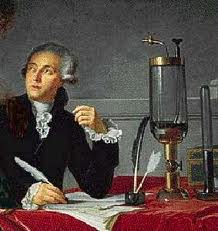Antoine Lavoisier is considered by many to be the "father of modern chemistry".
As well as being an economist and a public servant, he was the son of a nobleman and founded and termed both oxygen and hydrogen. Pretty impressive really.
At the age of 4 Lavoisier inherited a large fortune with the passing of his mother and was there after brought up by his devoted aunt and father. The family prized education highly so in 1754 Lavoisier was enrolled at Collège Mazarin, which was renowned for its science and mathematics faculty.

While at Mazarin Lavoisier had the good fortune to study under some of the best scientists of the age and proved himself to be a bright student. The ideals of the Enlightenment shaped his education and Lavoisier was particularly fascinated by Pierre Macquer's dictionary of chemistry.
Despite his love of science, Lavoisier went on to study law to please his family, earning a bachelor's degree and a license to practice in 1764.
Antoine Lavoisier never used his law degree however as he soon realized that science was his true passion and he returned to his studies of mineralogy and chemistry and produced his first chemical publication in 1764.
A year later he wrote and published a paper on how to improve the street lighting in Paris - it impressed the right people and in 1768 he was elected into the Royal Academy of Science (the most elite scientific body in France).
Lavoisier recognized that he would need a way to fund all his scientific experimentation so he took advantage of his administrative knowledge, and joined the Ferme Générale, a private company that collected taxes for the Crown.
The company was the target of popular hatred amongst peasants and merchants alike (something which probably did not help his cause during the Revolution) but Antoine Lavoisier was never known to be corrupt.

In 1771 Antoine Lavoisier married the daughter of a fellow fermier, Marie-Anne Pierrette Paulze. Although she was only 13 years old to Lavoisier's 28, the marriage was a success and Marie-Anne immediately became his faithful companion and assistant.
She helped Lavoisier with his experiments, expertly illustrating and recording them. She even took it upon herself to learn English (something with Lavoisier could not do) so that she could help her husband and stay up to date with the most recent experiments around the world.
With this strong, bright woman at his side AntoineLavoisier flourished and although his experiments might not have been spectacular by today's standards at his time they were quite revolutionary.
Through a series of experiments Lavoisier demonstrated the role of oxygen in the rusting of metal, along with oxygen's role in plant and animal respiration.
Lavoisier disproved the phlogiston theory prevalent at the time, which postulated that materials produced a substance called phlogiston when they burned.
Lavoisier's genius lay in the fact that he never accepted the preconceived notions of the age but always challenged them.
He had published several hundred works, each one richly illustrated by Marie-Anne, on subjects ranging from chemistry, geology and meteorology, to laboratory textbooks for use in academic programs.
As well as being a brilliant scientist Lavoisier was politically liberal and something of a philosopher.

He was convinced of the need for social reform in France but being such a high-profile figure of noble birth and a member of the deeply hated Ferme Générale did him no favors. Antoine Lavoisier was actually one of the few liberals in his position but when the revolutionary forces came knocking this wasn't taken into account.
On December 24th 1793 soldiers broke into Lavoisier's lab and arrested him because his habit of adding water and other ingredients to tobacco to prevent it from drying up too fast which was endangering the public's health .
At the same time 28 other members of the Ferme-Générale were also arrested by the new government's security forces.
Lavoisier was tried before the Revolutionary Tribunal on 7th May 1794 but like many others the trial was a farce.
Lavoisier's supporters made an appeal to the court to reconsider executing a man of such scientific genius on the grounds that he was important to France but the judge dismissed the appeal saying that the Republic had no need of scientists.
Antoine Lavoisier was condemned to death and on 8th May 1974, at the age of 51, he was guillotined along with his father-in-law and other fermiers-général.
Lavoisier's importance to science was encapsulated well by the mathematician Legrange who said "Cela leur a pris seulement un instant pour lui couper la tête, mais la France pourrait ne pas en produire une autre pareille en un siècle" ("It took them only an instant to cut off his head, but France may not produce another such head in a century").